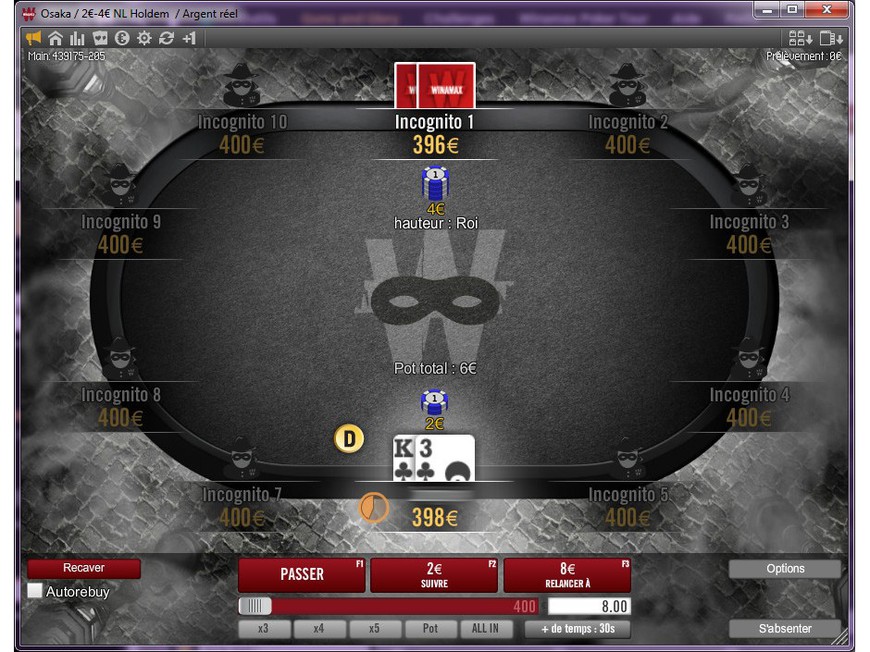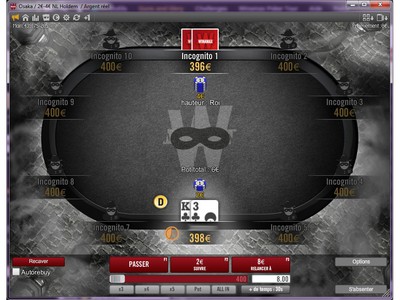

- Winamax—the French online poker market leader—has launched “incognito tables.”
- Not all players have embraced the growing trend. Many of the high-volume players believe it reduces the skill of the game by limiting the effectiveness of reads, table selection and seat selection.
- But one of the biggest objections to anonymous tables is that it greatly reduces the ability of the poker community to protect itself from cheaters, colluders, poker bots and unscrupulous operators that attempt to cheat their customers.
Winamax—the French online poker market leader—has launched “incognito tables,” anonymous cash game tables that hide your screen name from opponents.
All players seated at the tables are simply named “incognito 1” through to 10, based on their seat number. The chat box is also hidden at the new tables. The tables are available on all cash game stakes spread by Winamax.
Anonymous tables have become quite common in online poker over the past few years. Proponents of anonymous poker tables say it makes the game fairer for the average consumer by limiting the use of HUDs and tracking software.
However, not all players have embraced the growing trend. Many of the high-volume players believe it reduces the skill of the game by limiting the effectiveness of reads, table selection and seat selection.
Cheat Detection
One of the biggest objections to anonymous tables is that it greatly reduces the ability of the poker community to protect itself from cheaters, colluders, poker bots and unscrupulous operators that attempt to cheat their customers.
Some of the most famous cheating scandals in online poker were detected and uncovered by the players themselves by using “hand histories”—text files provided by the poker sites that show the action at the table and the screen names of the players. By crowd-sourcing hundreds of thousands and in some cases millions of hand histories, investigative-minded players on the Two Plus Two poker forums were able to perform mathematical calculations to identify abnormal win rates of accounts attached to certain screennames.
It eventually led to the discovery that representatives of the poker site were stealing millions of dollars from poker players.
The use of the hand histories showing players’ screennames has also uncovered unusual similarities in playing styles between some accounts denoting the use of prohibited software to operate poker bots. The use of hand histories has also to the discovery of collusion by identifying the frequency at which accounts play at the same table together.
Operator Interest
Online poker operators claim that anonymous tables help protect the poker ecology by allowing recreational players to hold onto their money longer which in turn increases their entertainment value and the probability that they will eventually deposit again.
The most vocal of anonymous online poker tables has been Bodog, where screen names at all games, including cash and tournaments, are hidden. The site was the first to completely remove all screeneames in November 2011.
Since then, many other operators have taken a more balanced approach by offering a selection of tables on their sites where players can compete in anonymity. Partypoker, iPoker and MPN all offer some form of anonymous tables.
However, some major operators have not followed in the anonymous footsteps of their competitors including PokerStars, Full Tilt and 888poker.
The proliferation of anonymous tables into regulated markets, such as in the US, has been slower than in non-regulated markets as operators and regulators alike learn to work together. Should regulations become more flexible with requirements to get new games to market, it is probable that some operators in regulated markets will try to differentiate themselves from the competition and cater to the players that seek to remain unknown to their opponents at the table.

